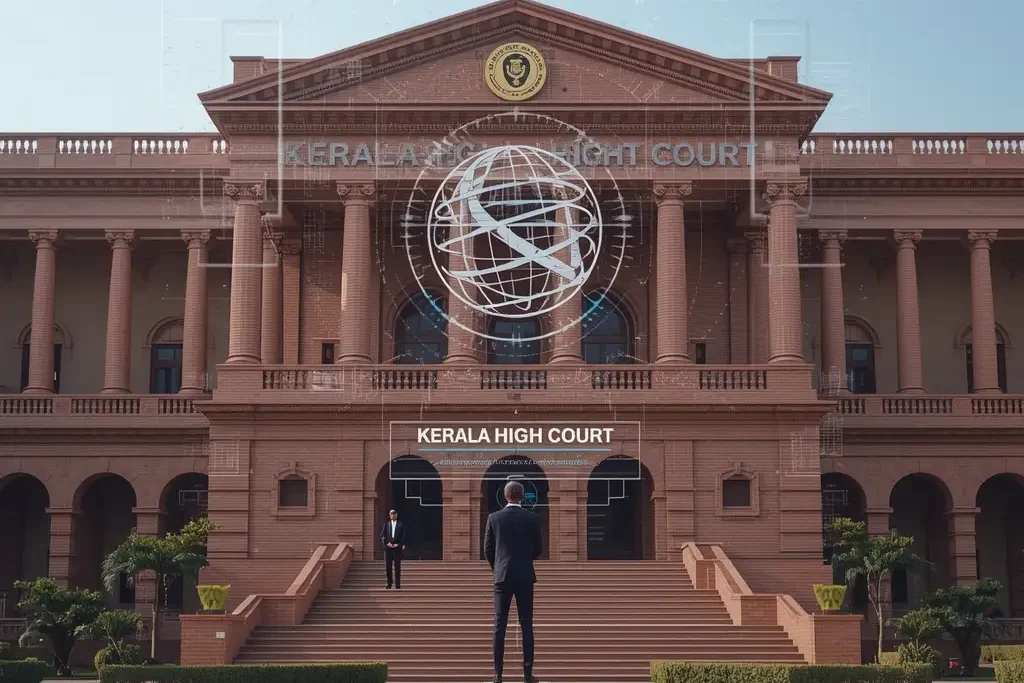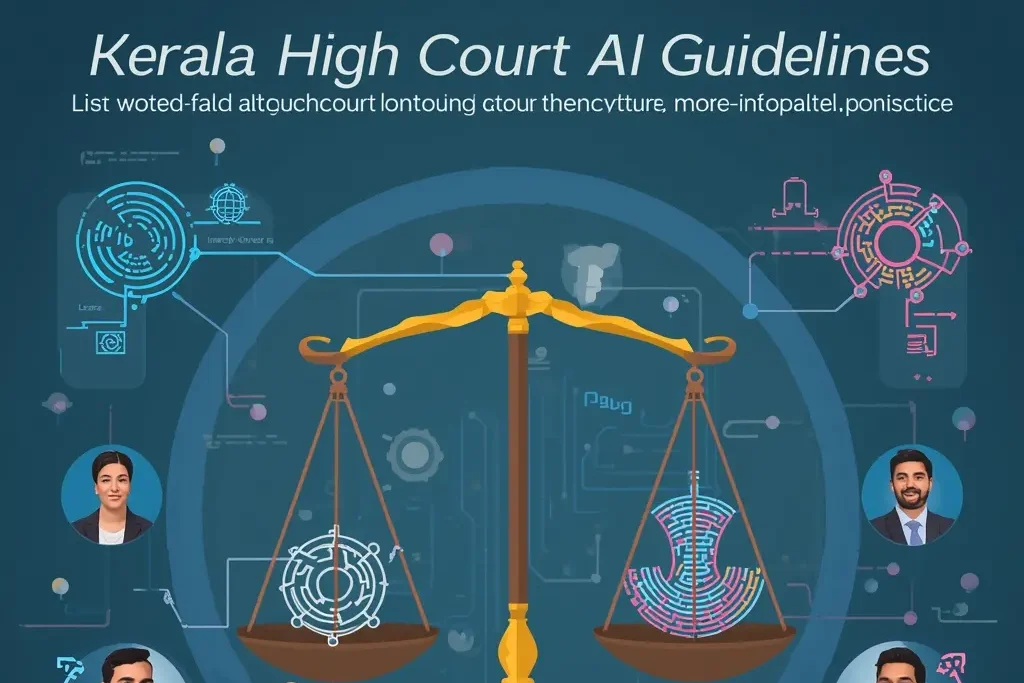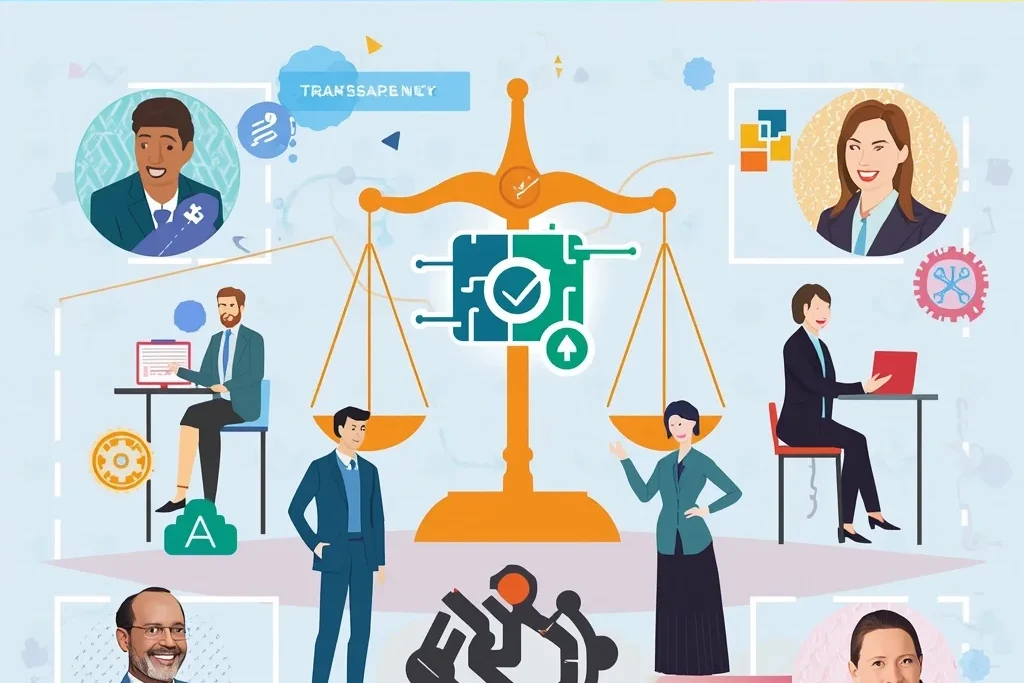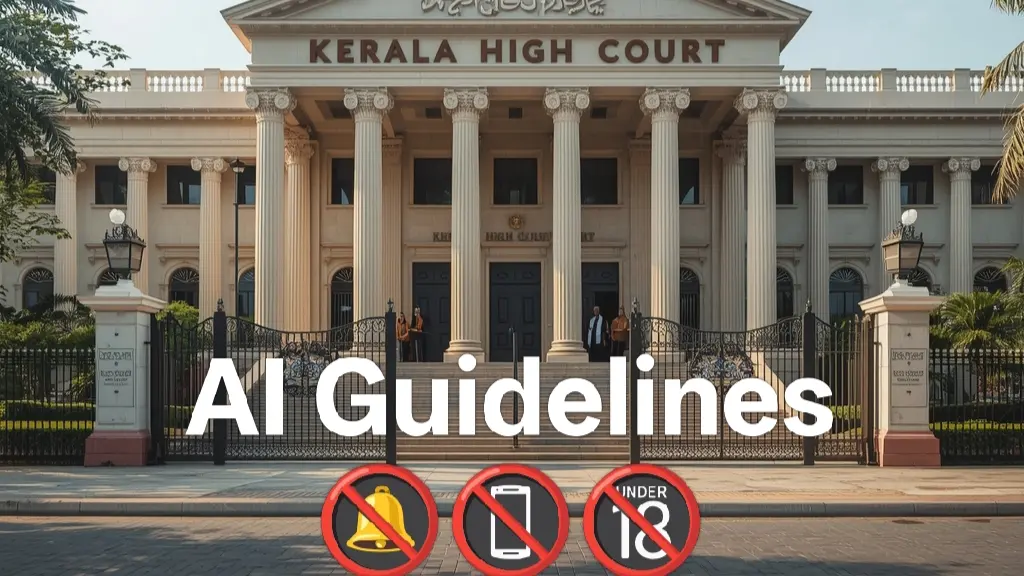Introduction
The fast growth of Artificial Intelligence (AI) across industries has reached the Indian judiciary, sparking discussions on ethics, transparency, and human oversight. Among the states leading this technological transformation is Kerala, where the Kerala High Court AI Guidelines have become a landmark in balancing innovation with judicial integrity.
These AI guidelines are designed to ensure that technology supports the justice system without compromising human judgment. As India explores AI-driven legal reforms, Kerala’s move sets a model for the nation and establishes what could become a national AI standard for judiciary governance.
Download Pdf 👉 ” Click Here “
What Are Kerala High Court AI Guidelines?

The Kerala High Court AI Guidelines aim to regulate how artificial intelligence tools are applied in judicial processes. Introduced under the supervision of the High Court’s administrative committee, the policy outlines the ethical and procedural boundaries for judges, court personnel, and legal researchers.
The guidelines emphasize three key principles:
- Transparency: Every AI-generated output should be traceable and verified by a human authority.
- Accountability: The final decision in any case must rest solely with human judges.
- Confidentiality: Sensitive judicial data must never be shared with third-party AI tools or platforms without permission.
By establishing these principles, the Kerala High Court AI Guidelines ensure that technology remains a supportive tool—not a decision-maker.
Why Did Kerala High Court Issue AI Guidelines?
The Kerala High Court AI Guidelines were introduced to address growing concerns about unregulated use of generative AI tools like ChatGPT or Bard in legal drafting, research, and decision-making.
Judges and clerks increasingly depended on AI for preparing judgments and legal references. While these tools offered efficiency, they also introduced risks such as misinformation, privacy violations, and potential bias. The Court recognized that without proper boundaries, AI could compromise judicial ethics.
Therefore, the Kerala High Court AI Guidelines serve to protect the credibility of the judiciary while allowing safe technological adoption.
How AI Affects Judicial Integrity in India
Judicial integrity is built on fairness, independence, and accuracy. The integration of AI into legal systems, while useful, can challenge these values. AI systems trained on biased or incomplete data may unintentionally influence verdicts or interpretations.
Through the Kerala High Court AI Guidelines, Kerala highlights the importance of maintaining human oversight. AI may assist in documentation or summarizing evidence, but the responsibility of interpreting and judging cases remains with human judges.
Here’s a short and simple table version 👇
| Aspect | Impact of AI on Judicial Integrity |
|---|---|
| Efficiency | Speeds up legal work but risks rushed judgments. |
| Transparency | Improves access to data but may hide algorithm bias. |
| Accuracy | Reduces manual errors yet can spread wrong data. |
| Ethics | Aids consistency but raises privacy concerns. |
| Human Role | Supports judges but should not replace judgment. |
By emphasizing integrity, Kerala’s approach positions it as a leader in developing an ethical AI ecosystem in Indian courts.
What Is Kerala’s AI Policy for Courts?

The Kerala High Court AI Guidelines focus on responsible innovation. They promote digital efficiency while preserving justice. The policy outlines:
- Controlled AI Usage: Only court-approved AI tools may be used for case management or legal research.
- Data Privacy: All AI systems must comply with Indian IT and data protection laws.
- Human Validation: Any AI-generated draft, order, or opinion must be verified by judicial officers.
The Kerala High Court AI Guidelines ensure that the human conscience remains the final authority in every legal decision.
Is AI Allowed in Indian Judiciary?
Yes, AI is allowed, but under strict supervision. The Indian judiciary recognizes the benefits of AI for managing backlogs, transcription, and legal analytics. However, it also understands the risks of overreliance.
While the Supreme Court of India has launched the SUPACE AI tool (Supreme Court Portal for Assistance in Courts Efficiency), Kerala’s model emphasizes transparency and caution. The Kerala High Court AI Guidelines ensure that technology enhances judicial efficiency without replacing human judgment.
Which AI Tools Are Banned by Kerala High Court?
The Kerala High Court AI Guidelines restrict the use of unverified or public AI tools that could expose sensitive judicial data. Platforms like ChatGPT, Google Bard, or open-source AI models are not allowed for preparing judgments or sharing case details.
Only secure, court-approved systems with strict data protection are permitted. This ensures that no confidential legal information leaves the judiciary.
| AI Tool / Platform | Status | Reason for Restriction |
|---|---|---|
| ChatGPT (OpenAI) | ❌ Banned | May expose confidential judicial data. |
| Google Bard / Gemini | ❌ Banned | Risk of privacy breach and inaccurate outputs. |
| Open-source AI models | ❌ Banned | Unverified data handling and no accountability. |
| Court-approved internal AI tools | ✅ Allowed | Operate under judicial supervision and data security laws. |
| SUPACE (Supreme Court AI Tool) | ⚠️ Limited Use | For research and case management only, not for judgments. |
The Kerala High Court AI Guidelines thus safeguard the sanctity of judicial data and prevent breaches of confidentiality.
How Will AI Change Indian Court Systems?
AI has already started transforming the Indian court system. Tools for virtual hearings, automated scheduling, and document translation are improving efficiency.
However, Kerala’s model stands out because it balances innovation with ethical caution. The Kerala High Court AI Guidelines ensure that human oversight remains essential, guaranteeing that justice is never rushed or influenced by automated systems.
Over time, this balanced model could redefine how AI reshapes India’s judicial framework—blending technology with traditional judicial values.
What Are National AI Standards for Judiciary?

The national AI standards for judiciary are still being developed. However, the Kerala High Court AI Guidelines could serve as a blueprint for the rest of India.
They define ethical limits for AI use and promote uniform practices across courts. The Ministry of Law and Justice is studying Kerala’s model to design a national-level AI framework for the judiciary.
With this initiative, Kerala is setting a judicial benchmark for other states, proving that innovation and integrity can work hand in hand.
What Is the Purpose of Kerala High Court AI Guidelines?
The main purpose of the Kerala High Court AI Guidelines is to create a judicial environment where technology enhances efficiency without undermining the authority or ethics of human judgment.
Their goals include:
- Ensuring data security and privacy of court information.
- Promoting transparency in AI-assisted processes.
- Preventing bias and misinformation from influencing judgments.
- Encouraging digital innovation within ethical boundaries.
By achieving these objectives, Kerala’s judiciary becomes a national leader in AI governance for courts.
The Role of AI in Legal Research and Drafting
AI-powered tools can process thousands of pages of case law in seconds, offering quick references to judges and lawyers. However, they cannot interpret human emotions, moral nuances, or local precedents the way human judges can.
The Kerala High Court AI Guidelines acknowledge this limitation and encourage AI use only as a supportive assistant—not a substitute for judicial reasoning.
This ensures that legal interpretations remain grounded in empathy and constitutional values.
Judicial Training and AI Literacy in Kerala
One of the highlights of the Kerala High Court AI Guidelines is the focus on training programs for judges and court staff. These programs build AI literacy and awareness of ethical practices.
By educating judicial officers, Kerala ensures that everyone understands both the potential and the risks of AI, leading to more consistent and transparent practices across all levels of the judiciary.
Data Protection and Confidentiality
Judicial data often contains sensitive information such as witness statements, personal details, and evidence. The Kerala High Court AI Guidelines emphasize data protection to prevent leaks or unauthorized access.
They align with India’s Digital Personal Data Protection Act (DPDPA) and IT laws to ensure complete confidentiality. This makes Kerala’s judiciary a pioneer in adopting AI within a secure legal framework.
Human Oversight: The Heart of Judicial AI Policy
No matter how advanced AI becomes, the Kerala High Court AI Guidelines insist that the final judicial responsibility lies with humans.
This principle is consistent throughout the policy, reaffirming that AI can only recommend—not decide. The guidelines ensure that judges review and validate every AI-generated output before use.
Public Trust and Transparency in AI Use
Public trust is the foundation of any judicial system. If people believe judgments are automated, they might lose faith in fairness.
By publishing the Kerala High Court AI Guidelines, the judiciary demonstrates transparency in AI adoption. This openness reassures citizens that human integrity remains central to justice delivery.
Kerala’s Model and Its National Influence
Since their announcement, the Kerala High Court AI Guidelines have gained national attention. Legal experts and policymakers see Kerala’s initiative as a template for AI governance in the judiciary.
States like Tamil Nadu, Maharashtra, and Karnataka are expected to develop similar frameworks, ensuring ethical uniformity across the Indian legal system.
Balancing Efficiency and Ethics
Efficiency and ethics often conflict in technological governance. While AI can accelerate judicial work, it also raises moral concerns.
The Kerala High Court AI Guidelines perfectly balance these needs by setting clear limits while promoting innovation. The message is simple — use AI for efficiency, but never for moral or legal judgment.
Challenges Ahead for AI in Judiciary
Despite Kerala’s leadership, several challenges remain:
- Limited AI infrastructure in lower courts.
- Lack of uniform data standards.
- Cybersecurity risks.
- Shortage of trained AI professionals.
The Kerala High Court AI Guidelines address some of these issues, but national collaboration will be needed to strengthen AI governance across India.
Future of AI in Indian Judicial System
The future of AI in India’s judiciary looks promising but cautious. As more courts experiment with AI tools for transcription, translation, and analytics, Kerala’s policy serves as a moral compass for responsible AI use.
The Kerala High Court AI Guidelines will continue to evolve with technology, ensuring that justice remains human-centered even in the digital age.
Conclusion
The Kerala High Court AI Guidelines mark a new era for India’s judiciary. By combining innovation with integrity, Kerala has created a framework that other states can follow.
As India moves toward a tech-driven legal future, Kerala’s model ensures that fairness, transparency, and human judgment never fade in the pursuit of progress.
These guidelines not only protect judicial integrity but also spark a national dialogue on ethical AI use, proving that true justice must always be guided by human wisdom—not algorithms.
Further Readings:
- Google India Law Internship 2025 for Law Students in Gurgaon
- Medical Device packaging Regulations just got smarter!
- How India’s Agriculture Policies Are Changing Farmers’ Lives!


I don’t think the title of your article matches the content lol. Just kidding, mainly because I had some doubts after reading the article.